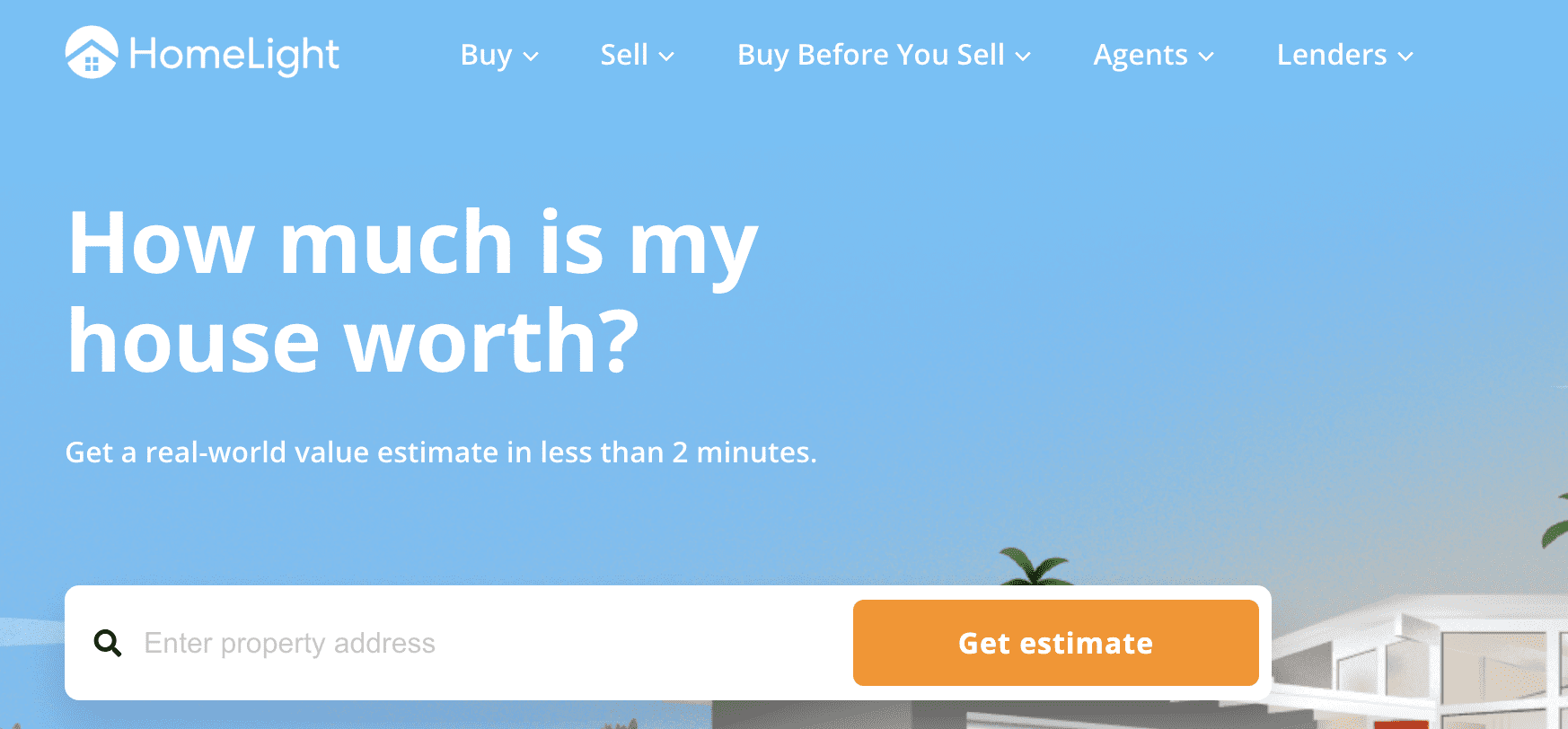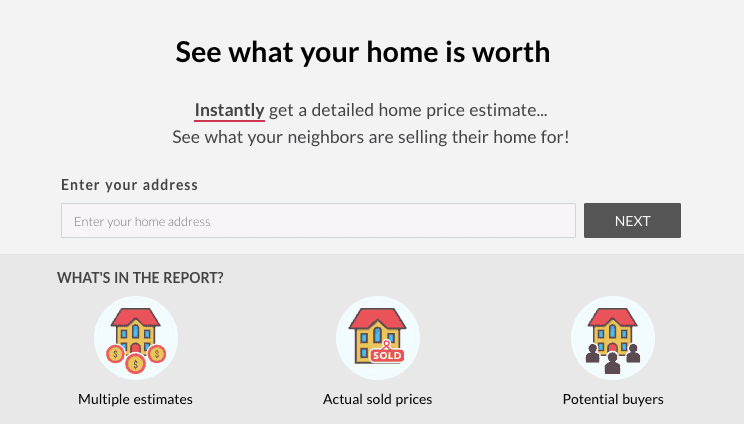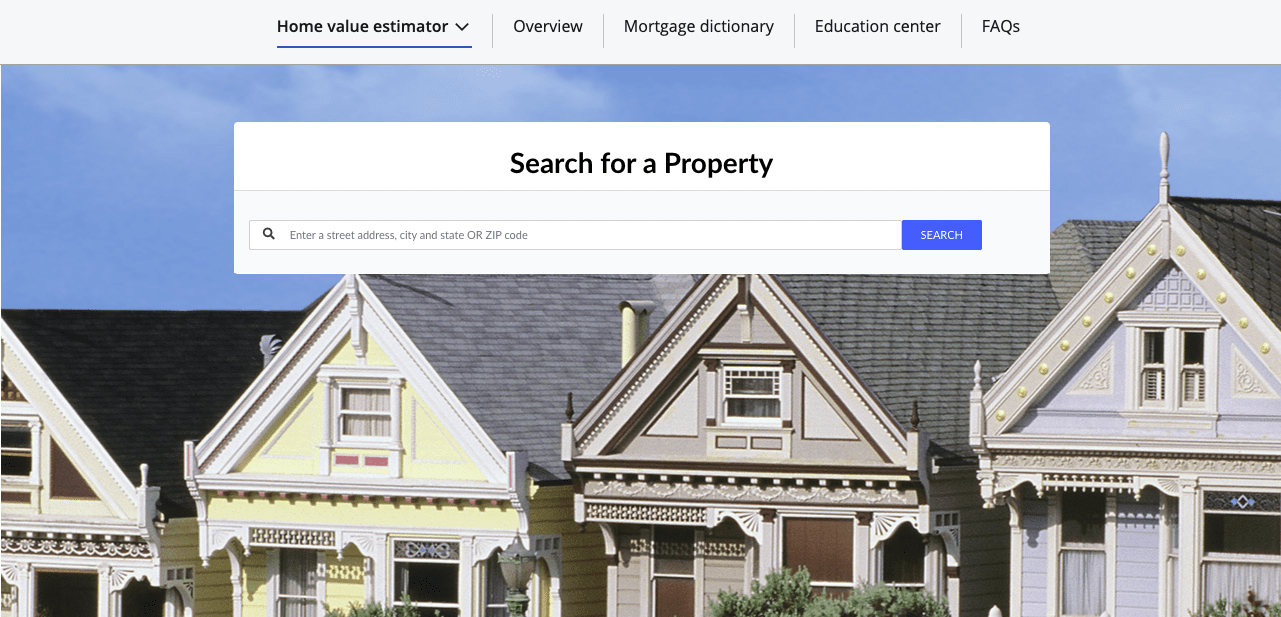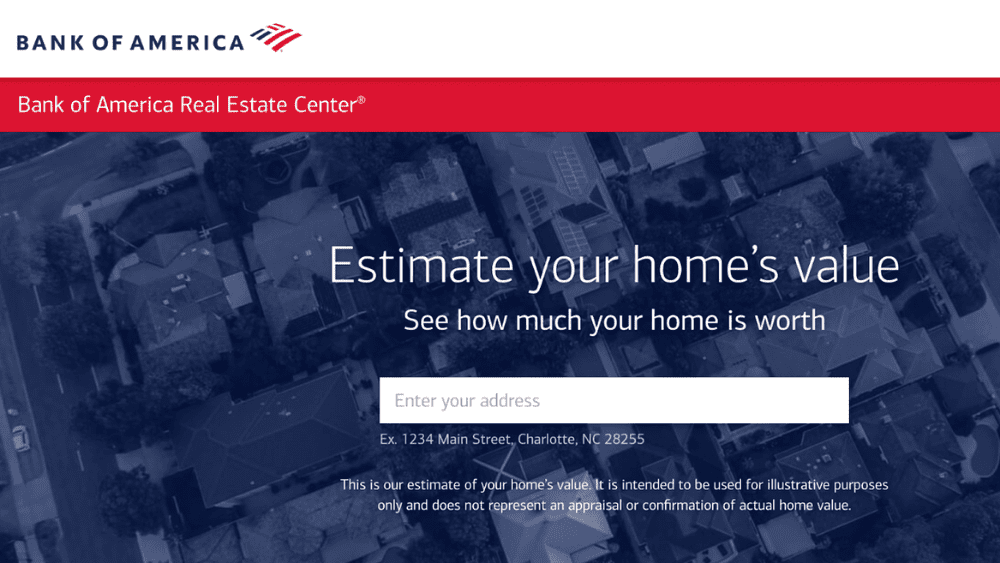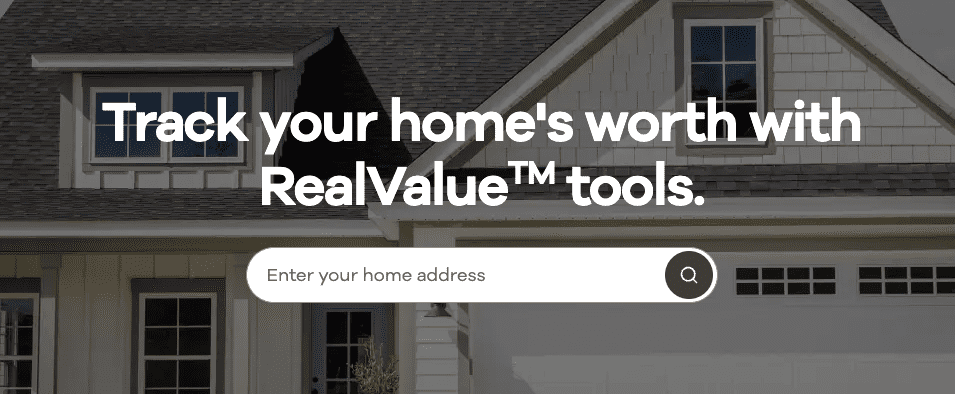8 of the Top Free Online Home Value Estimators for 2026
- Published on
- 15 min read
-
Adrian E. Hirsch, Contributing AuthorCloseAdrian E. Hirsch Contributing Author
Adrian E. Hirsch is a South Louisiana interviewer, writer, editor, blogger and scriptwriter. She’s covered the region’s unique lifestyle, landmarks, architecture, art, antiques, food, music, pets and healthcare issues for the Los Angeles Times Syndicate, New Orleans, Memphis and Gambit magazines among others. Having bought, sold and built homes, she’s survived the whims of the market, contractors, kids, rescued cats and dogs—not to mention hurricanes, erosion and termite invasion. Her real estate reporting aims to help families find the right home and maximize the potential of that major investment.
-
Taryn Tacher, Senior EditorCloseTaryn Tacher Senior Editor
Taryn Tacher is the senior editorial operations manager and senior editor for HomeLight's Resource Centers. With eight years of editorial and operations experience, she previously managed editorial operations at Contently and content partnerships at Conde Nast. Taryn holds a bachelor's from the University of Florida College of Journalism, and she's written for GQ, Teen Vogue, Glamour, Allure, and Variety.
Whether they’re considering selling their property, refinancing their mortgage, or simply curious about their investment’s current market value, many people want to know: “What’s my home worth today?” Free online home value estimators can give you an idea of what your house might sell for or how much home equity you’ve banked so far.
Many lenders and real estate companies have an automated valuation model (AVM) on their website where you can input your address to get a result. None of these tools acts as a substitute for a formal appraisal or the in-person expertise of a real estate agent, but they can be a useful starting point.
Most aggregate some combination of county auditor and tax assessor records, user-submitted data, and multiple listing service (MLS) listings and sales to produce the estimate.
You may be curious to know which online home value estimator is the best or which website is most accurate. A home’s square footage, acreage, number of bedrooms, bathrooms, and year built are some of the main data points used for calculating value — but each tool may have blind spots where data is limited or only offer coverage of certain market areas.
One option is to put your address through a few different tools to see what you get. We queried the eight sites below for their estimate of the same home in the Dunwoody suburb of Atlanta, so you can get a sense of what each one provides:
| Tool | Estimated value of test home | Median error rate | Refresh rate |
| HomeLight’s Home Value Estimator | $507,809 | On-market homes: 2%-5%*. | N/A |
| RE/MAX | $582,068 – $599,662 | On-market homes: 2%-5%*. | N/A |
| Chase Mortgage Services | $453,300 | On-market homes: 2%-5%*. | N/A |
| Zillow Zestimate | $467,400 | On-market homes: 1.83%
Off-market homes: 7.01% |
Multiple times per week, may be interrupted by algorithmic changes or new analytical features |
| Bank of America | $495,779 | On-market homes: 2%-5%*. | N/A |
| Realtor.com | $488,600 | On-market homes: 2%-5%*. | Frequently as market conditions change |
| Redfin Estimate | $456,471 | On-market homes: 1.99%
Off-market homes: 7.67% |
Daily for homes that are for sale, weekly for off-market homes |
| Eppraisal | $635,592 – $674,907 | On-market homes: 2%-5%*. | N/A |
*The median error rate for homes listed for sale is estimated to fall within 2%-5% where limited data is available.
We ran an address for a 2,305-square-foot home on a 0.3-acre lot with three bedrooms and two-and-a-half baths in the Dunwoody suburb of Atlanta through each of the above tools.
Now, let’s review each tool more in-depth.
HomeLight’s Home Value Estimator
Value of test home: $507,809
Methodology: How does it work?
With HomeLight’s tool, you can input your address and the software will analyze millions of real estate transactions, collect details about your property with a short questionnaire, and pull in the most important elements of a comparative market analysis. Users then receive a preliminary estimate of value in under two minutes sent to their email inbox.
What information do you need to provide for the best calculation?
- What’s your address?
- Are you thinking of selling soon?
- What’s the condition of your home? (needs nothing, needs a little work, needs significant work, or teardown)
- Anything else you’d like to tell us about your home?
- Email address for where to send the estimate
How does the tool fit into what the company does?
HomeLight is a real estate technology company that provides an array of services to buyers, sellers, and real estate agents. Through HomeLight, you can connect with a top real estate agent or request a cash offer on your home. You can also use the company’s Buy Before You Sell program to purchase your next home.
How is this tool different from others?
For a deeper understanding of your home’s value and current market trends, you’ll want to get a comparative market analysis from a local real estate agent. HomeLight provides a list of top-rated agents in the same email that contains your home value estimate, making it easy to take the next step if you so choose.
What are the limitations of this tool?
Because it is not a formal appraisal, HomeLight’s estimator does not factor in renovations or other home improvements you’ve made unless you share that information in the questionnaire. For that reason, it’s best to consider the estimate as a starting point and to seek a comparative market analysis from a local real estate agent for a deeper understanding of your home’s value.
Reviews
- BBB: HomeLight is accredited with an A+ rating and a 4.18-star review.
- Google: HomeLight has a 4.8-star Google rating. A customer who used HomeLight said, “HomeLight was very helpful by doing the research and providing the information on realtors with top sales in my area. They also provided information on the number of sales in my area.”
RE/MAX
Value of test home: $582,068 – $599,662
Methodology: How does it work?
Visit a RE/MAX agent’s profile, enter your address, and click the ‘Next’ icon. The next screen shows a range of estimated values provided by Zillow and HomeJunction, which manages over 325 MLS RETS and RESO API feeds, resulting in a complex data set that produces the value estimate.
What information do you need to provide for the best calculation?
- Address only
How does the tool fit into what the company does?
RE/MAX is a real estate franchisor with offices all over the world.
How is this tool different from others?
Users will need to click on the home valuation link associated with a RE/MAX Agent before seeing the results. RE/MAX may follow up with a more accurate assessment.
What are the limitations of this tool?
While useful, the RE/MAX home value estimate tool is not a formal appraisal and may not fully account for specific home improvements or unique property features. RE/MAX’s update to its valuation tool allows for a more detailed valuation to be provided by a local RE/MAX agent, whose profile is associated with the link users will use to access the tool.
Reviews
- Trustpilot: 2.0/5 stars
- Yelp: 3.7/5 stars. Reviews mention the stellar performance of individual RE/MAX agents.
Chase Mortgage Services
Value of test home: $453,300
Methodology: How does it work?
When you type your address into the database, Chase generates an estimated price, a map that shows your property, and the sales prices of neighboring homes.
What do you need to provide?
- Address only
How does the tool fit into what the company does?
Chase offers an array of financial services. Through Chase, you can apply for a mortgage, refinance your home, or take out a home equity line of credit.
How is this tool different from others?
Chase’s home value estimator is powered by robust data collected from over 10,000 government and proprietary sources. Although Chase doesn’t ask for user-submitted information upfront, a user can adjust the number of beds, baths, total rooms, and total square footage boxes to either represent recent upgrades or forecast the value of a remodeling project. The tool also automatically pulls in a module displaying recent nearby sales information.
What are the limitations of this tool?
As with other automated valuation models, the Chase Mortgage Services home value estimator tool is not a substitute for a formal appraisal. While it provides a quick estimate based on extensive data sources, it may not fully capture the nuances of specific property improvements, unique features, or rapidly changing local market conditions. For a definitive valuation, particularly for significant financial decisions like selling your home or refinancing, it’s advisable to consult with a qualified appraiser or a local real estate agent.
Reviews
- BBB: A+ rating (Not accredited)
- Yelp: 1.3/5 stars
Zillow Zestimate®
Value of test home: $467,400
Methodology: How does it work?
Enter your address into the tool and click “Get Started.” This will lead you to a screen with your home’s Zestimate®, but to view more, you’ll need to create a Zillow account or log into your existing one.
Zillow’s Zestimate® inputs public, MLS, and user-submitted data into a proprietary formula, which gives consideration to home facts, location, and market trends.
The company offers an up-to-date margin of error for top metropolitan markets and every state. The nationwide median error rate for listed homes hovers around 1.83%; the rate for off-market properties is approximately 7.01%.
What do you need to provide for the best calculation?
- Address only for standalone estimate
- Creation of a Zillow account to see additional details
How does the tool fit into what the company does?
Zillow and its affiliates offer consumers an array of products and services for selling, buying, renting, and financing homes. The company is known as a top website where you can shop for homes online.
How is this tool different from others?
Launched in 2006, Zillow is the original home value estimator tool. When you enter the home address and click “Get started,” the software generates an estimate and lists the square footage, number of bedrooms, and number of bathrooms for the property.
The page breaks out the factors contributing to the estimate — specific figures on comparable homes, tax assessment, and sales comps. It features a menu of graphs illustrating your home’s value, rental rates, and listing prices over the past 10 years.
What are the limitations of this tool?
The AVM’s accuracy depends on the availability of data in a home’s geographic location. In some markets, home information — such as square footage, number of bedrooms and bathrooms, and other details — is more accessible than in other regions.
Because it relies on publicly available information and user-submitted data, the Zestimate® may not account for recent renovations, unique property features, or specific local market nuances that aren’t captured in its database. This means that while it provides a useful starting point, it shouldn’t be considered a substitute for a professional appraisal or a comparative market analysis by a local real estate agent, especially for significant financial decisions.
Reviews
- Trustpilot: 1.5/5 stars
- Yelp: 1.9/5 stars
Bank of America
Value of test home: $495,779
Methodology: How does it work?
Once you enter your address, a screen pops up with your estimated home value alongside Google Earth pictures of your home’s exterior, number of beds and baths for the property, and the square footage.
What information do you need to provide for the best calculation?
- Address only
How does the tool fit into what the company does?
Bank of America offers financial services for home loans and refinances.
How is this tool different from others?
Bank of America’s tool displays MLS property details such as whether the house has a garage, pool, or fireplace, and you can scroll down to see a shaded line graph showing the home’s value over a 10-year period as well as nearby comparable homes in a map format.
What are the limitations of this tool?
Like other automated valuation models, the Bank of America home value estimator tool is not a substitute for a formal appraisal. While it provides a quick estimate based on extensive data sources, it may not fully capture the nuances of specific property improvements, unique features, or rapidly changing local market conditions. For a definitive valuation, particularly for significant financial decisions like selling your home or refinancing, it’s advisable to consult with a qualified appraiser or a local real estate agent.
Reviews
- BBB: Bank of America is accredited with an A rating and a 1.13-star review.
- Trustpilot: 1.3/5 stars
Realtor.com
Value of test home: $488,600
Methodology: How does it work?
Its AVMs compile basic property characteristics, local market information, and price trends to produce a home value estimate.
Realtor.com is the only site that gathers estimates directly from multiple, independent AVM providers. To offer consumers access to the same providers used by real estate lenders, investors, and brokers, Realtor.com sources its estimates from Collateral Analytics, CoreLogic, and Quantarium.
The company asserts homeowners benefit from the multi-pronged approach because presenting data from multiple sources with their own unique algorithms provides a more complete picture of a home’s potential value.
What information do you need to provide for the best calculation?
- Address only for standalone estimate and percent increase or decrease from the previous month
- Must share Facebook, Apple, and email address or create an account to access advance information
How does the tool fit into what the company does?
Realtor.com is a major home search and real estate media website.
How is this tool different from others?
If you “claim” your home by logging in with Facebook, Apple, or your email address, you have access to information on an owner’s dashboard. That page includes a graph of your home’s value over the past five years, market trends for your area, the property sales history, a home sale net proceeds calculator, and additional metrics and tools.
What are the limitations of this tool?
Similar to other automated valuation models, the Realtor.com home value estimator tool should not be considered a substitute for a formal appraisal. While it aggregates data from multiple AVM providers to offer a comprehensive estimate, it may not always fully account for unique property characteristics, recent unrecorded renovations, or highly specific local market dynamics that can significantly influence a home’s true value. For definitive valuations, especially for major financial decisions like selling a home or securing a mortgage, a professional appraisal or a comparative market analysis from a local real estate agent is recommended.
Reviews
- BBB: Realtor.com is accredited with an A+ rating.
- Google: 4.1/5 stars
Redfin Estimate
Value of test home: $456,471
Methodology: How does it work?
Users enter their address and Redfin delivers an immediate estimate of value along with the chance to claim “I’m the owner” of the property. After verifying ownership, a user can update and make corrections to their property details, similar to how they can on Realtor.com and Zillow. Pulling data directly from the MLS, Redfin bases its calculations on the value of recently sold homes in your area.
What information do you need to provide for the best calculation?
- Address only
How does the tool fit into what the company does?
Redfin is a real estate brokerage that charges a discounted rate (1% or 1.5%) for its listing services.
How is this tool different from others?
On its website, Redfin says Redfin Estimate is highly accurate among leading automated home-value tools, with a median error rate of 1.99% for on-market homes. If your geographic area is within its service zone, Redfin generates an estimate and displays a map with photos of other properties that have sold in the area. There’s also a link to schedule a sales consultation.
What are the limitations of this tool?
Similar to other automated valuation models, the Redfin Estimate has limitations. Its calculations primarily rely on data pulled directly from the MLS, which means it might not fully account for unrecorded renovations, unique property features, or specific local market nuances that aren’t immediately visible in public or MLS data. While Redfin prides itself on a low median error rate for on-market homes, this accuracy can vary depending on data availability and the recency of comparable sales in a given area. For critical financial decisions like selling your home or securing a mortgage, the Redfin Estimate should serve as a starting point, not a definitive valuation, and should be supplemented with a professional appraisal or a comparative market analysis from a local real estate agent.
Reviews
- Trustpilot: 2.4/5 stars
- Yelp: 3.5/5 stars
Eppraisal
Value of test home: $655,250 with a range of $635,592 – $674,907
Methodology: How does it work?
Eppraisal’s agents provide a free, detailed report after looking at the specific details of your property and the latest market data.
What information do you need to provide for the best calculation?
- Name and email address
- Street name and ZIP code
How does the tool fit into what the company does?
Eppraisal provides real estate tools for professionals and resources for consumers.
How is this tool different from others?
Eppraisal’s updated model requires that you connect with their agents before receiving information about your home’s current value.
What are the limitations of this tool?
While Eppraisal offers a quick, free estimate, its primary limitation lies in the additional step required to receive your home valuation.
Reviews
- BBB: A+ rating (Not accredited)
What’s next after I receive my estimate?
After you receive your estimate, we recommend connecting with a top real estate agent who will conduct a comparative market analysis on your behalf to lock in a pricing strategy. With an estimate in hand, you can also calculate the cost of selling your home and find out the net proceeds of the sale.
Header Image Source: (MockupEditor.com/ Pexels)
Home value FAQs
You can calculate a home’s value by using a free online valuation tool, hiring an appraiser, or working with a real estate agent to get a comparative market analysis (CMA). Free online home value calculators look at transactions in your area and public data to generate an estimate. But, if you’re looking for a more accurate number, you’ll need to work with a real estate professional who will look at your property’s condition, the market trends in your area, and other factors to calculate your home’s worth.
The most common method for determining home value involves an analysis of comparable sales. With this approach, recently sold homes similar to yours in size, age, and condition are identified as “comps,” which serve as a baseline for calculating your own home’s worth. Any differences in your home that would add or subtract value, such as an extra bedroom or aging roof, will factor into the calculation.
There are different ways to gather the data and information necessary for this type of analysis. Online tools will pull from publicly available records, gather real estate transaction data, and ask users to share updates about their property. An algorithm is able to make sense of those numbers instantly, resulting in a real-time valuation.
A real estate agent will be able to go a step further and access comps from their local MLS and even conduct a walkthrough of the property. These steps give them greater insights into the area and the ability to provide you with a CMA. Appraisers typically work from the Uniform Residential Appraisal Report and will physically measure the interior and exterior of the home in an onsite visit to make sure the public records are accurate.
What adds value to your home depends on a variety of factors. Some of these variables are external, like a job market that attracts new residents to your area, easy access to trails and parks, or the development of local restaurants and shopping centers nearby.
A booming economy and market drivers like a low supply of inventory also work in your favor. These influencers have the potential to boost demand for your home and help it sell for more money.
Other factors are within your control. Improving your curb appeal with basic lawn care and cleanup improves the marketability of your home. You can also invest in larger upgrades that add value (just be sure to check on the ROI), and keep the house in great shape with proper maintenance over time.
Finally, to maximize value, be sure to list your home during the best time to sell for your city and make the effort to clean, declutter, and stage the home to impress.
Generally speaking, automated valuation models run some combination of county auditor and tax assessor records, user-submitted data, and property listings and sales through a unique algorithm to arrive at a home value estimate. If you’re curious about a detailed explanation of the home value estimation process, the short answer is: it varies.
These tools comb through millions of pieces of data almost instantly. With HomeLight’s estimate tool, you can simply input your address, and the software will analyze millions of real estate transactions, collect details about your property with a short questionnaire, and pull in the most important elements of a comparative market analysis to calculate your home’s worth. Keep in mind real estate experts advise using these tools as a starting point rather than the final word.
Home value is the amount that buyers are willing to pay for a property, depending on a number of factors, such as the location and condition of the home. Fair market value refers to the price that an average or reasonable buyer would spend on a house when there is no existing relationship with the seller, and no extenuating circumstances endearing the buyer to that particular house.
It’s a good idea to check up on your home’s value periodically and start owning your home’s history and value online. When the time comes to sell, buyers are going to look up your address, and if the internet says your home is worth less than you’re asking for, it could weaken your negotiating position.
In the weeks and months leading up to listing the property, looking up your home’s value before you sell gives you an idea of how much you can list it for and how your home compares to other listings in the area at that time. You should also check your home’s value when you’re thinking of making major changes to your property, like renovations or updating property insurance.
Home value estimates provide a helpful starting point but often lack pinpoint accuracy. They rely on algorithms analyzing publicly available data like recent sales, tax assessments, and property characteristics. Factors such as outdated records, unique property features, or rapid market changes can skew results. Most estimators, like Zillow’s Zestimate or Redfin’s home value tool, disclose median error rates — typically 2%-5% for on-market homes but higher for off-market properties. While convenient, you should remember that these tools are just that – tools. They should complement professional appraisals or comparative market analyses for critical decisions like pricing a home for sale or refinancing. Always verify estimates with local market insights.





